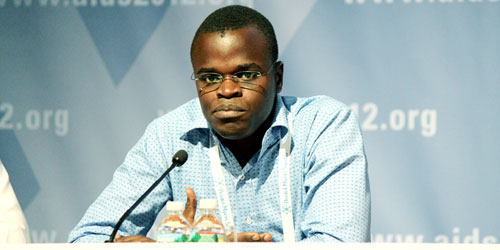BY Bob Roehr

The rate of new HIV infections is coming down in many countries around the world, "but that is not happening among men who have sex with men (MSMs)," Chris Beyrer said at that XIX International AIDS Conference.
"The consistent pattern, in developed and developing countries, in low and middle income countries, in wealthy countries, is of expanding HIV epidemics," said the Johns Hopkins University epidemiologist.
The factors that account for this are the greater risk of transmission through anal intercourse, regardless of the partner's sex; a more rapid transmission within the networks of MSMs; stigma and discrimination that limits access to prevention and treatment services; and even when persons have access to healthcare, they are less likely to fully suppress their virus.
"All of those structural barriers allow for continued transmission," Beyrer said. "We must address those structural and social realities," as well as develop new biological interventions designed for the needs of men who have sex with men.
Africa
There is a huge denial that MSM even exist, Ugandan physician Paul Semugoma told a plenary session of the conference. "In the fourth decade of the HIV pandemic, we still have countries in the world which do not have HIV statistics for men who have sex with men."
Even though the rate of HIV infection is higher among MSMs in every country in the world, resources are not targeted to that population because same sex activity remains criminalized. He said, "Less and less gets to the MSMs because of the stigma, because they are criminals."
And often MSMs are targets of discrimination. Semugoma used the example of Senegal where in the mid-2000s the epidemic was concentrated among MSMs. Prevention activities were largely targeted to this population. The results of this work were presented at a regional AIDS conference in Africa.
But rather than being praised, it led to the arrest of nine of the outreach workers on charges of promoting homosexuality, and their being jailed for several months. They were finally released, in part because of international pressure.
The Ugandan government has threatened to close a clinic that was recently opened to serve the LGBT community, "simply because they think it is going to promote homosexuality," Semugoma said.
Kenya still has anti-gay laws on the books, but it has managed to work around them in creating HIV programs for MSMs, he said. "Right now they are miles ahead of us" in Uganda. Other countries, such as Zambia, have decided to do nothing.
Solutions
The resources are not following the continued expanded epidemic, said Australian Don Baxter, cochair of the Global Forum on MSM & HIV.
The largest source of funding is from the Global Fund to Fight AIDS, Tuberculosis and Malaria. "But it is essentially country driven and many countries have not included MSMs in programs," he said. The few MSM programs that exist are supported by international funds and are not part of host government activities.
Brazil, South Africa and India "pretty much are paying for their own MSM programs on a scale that is likely to be effective," while China is making some progress toward that goal Baxter said. "Russia is a complete failure and is refusing to invest money in any of its MSM programs."
Projections are for MSM to constitute half of all new infections in Asia by 2020. Most of the countries have achieved a level of economic development that makes them ineligible to receive Global Fund support. Baxter called upon the World Bank to help fill that gap.
Semugoma called for structural changes in laws and society as a crucial component for successfully tackling the epidemic. He said, "We have to end the invisibility (of MSMs) in service delivery and decision making,"
"There are critical issues of funding, of will, and of political leadership that threaten our being able to take advantage of this historic moment" of optimism about curtailing the epidemic, said American AIDS advocate Cornelius Baker.
US Black political leaders often have provided leadership in this area, but that has proven to be rarer in socially more conservative regions such as the South. Baker said, "We have to look at the social construct of homophobia."
Global Forum president George Ayala pointed to "vibrant movements" in Nepal and India that have brought about decriminalization of homosexuality and greater inclusion in society and particularly HIV programs. The situation also is improving in much of South America.
One key element for continued progress will be support for local gay communities, which often exist though they may not be readily visible.
The prestigious medical journal The Lancet produced a special issue HIV in Men Who Have Sex with Men that was released immediately prior to the conference. It's content is available for free, though registration is required.










